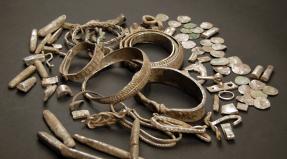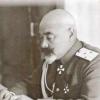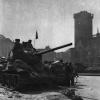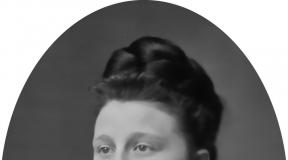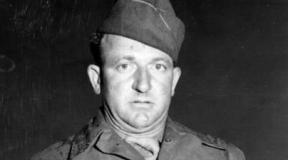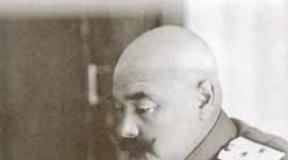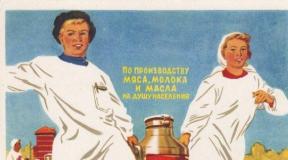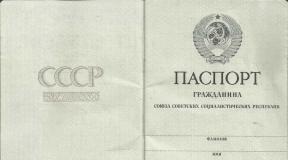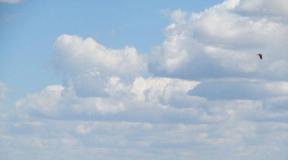General a and Denikin in the scout magazine. Career after the Russo-Japanese War. The period of the biggest victories
General Staff Lieutenant General Denikin A.I. *)
DENIKIN Anton Ivanovich (1872-1947), Russian military leader, lieutenant general (1916). In World War I, he commanded a rifle brigade and a division, an army corps; from April 1918 commander, from October commander-in-chief of the Volunteer Army, from January 1919 commander-in-chief of the "Armed Forces of the South of Russia" (Volunteer Army, Don and Caucasian Cossack armies, Turkestan army, Black Sea Fleet); simultaneously from January 1920 "The Supreme Ruler of the Russian State". Since April 1920 in exile.
Commander-in-Chief of the Armed Forces of Yugoslavia, General Staff Lieutenant-General Denikin A.I.,
1919, Taganrog. *)
DENIKIN Anton Ivanovich (1872, village Shpetal Dolny, Warsaw province - 1947, Ann Arbor, Michigan, USA) - military leader, one of the leaders of the white movement. Born into a poor family of a retired major, a former serf peasant. In 1882 - 1890 he studied at the Lowichi Real School and showed brilliant talent for mathematics. Since childhood, dreaming of military service, in 1892 he graduated from the Kiev infantry cadet school. In 1899 he graduated from the Academy of the General Staff and was promoted to captain. In 1898, in a military journal. "Scout" was published the first story of Denikin, after which he worked a lot in military journalism. He expressed the essence of his political sympathies as follows: "1) Constitutional monarchy, 2) Radical reforms and 3) Peaceful ways of renewing the country. These worldviews I conveyed indestructiblely to the revolution of 1917, not taking an active part in politics and giving all my strength and labor to the army." During Russo-Japanese War 1904 - 1905 showed excellent qualities of a military officer, reaching the rank of colonel, and was awarded two orders. He reacted extremely negatively to the revolution of 1905, but he welcomed the Manifesto of October 17, considering it the beginning of transformations. Believed that the reforms P.A. Stolypin will be able to resolve the main issue of Russia - the peasant one. Denikin served successfully and in 1914 was promoted to major general.
 With the outbreak of the First World War, he commanded a brigade and a division. Denikin's valor, shown in battles, the highest awards (two St. George's crosses, St. George's weapon, decorated with diamonds) raised him to the top of the military hierarchy. The February Revolution of 1917 stunned Denikin: "We were not prepared at all for such an unexpectedly quick denouement, or for the forms that it took." Denikin was appointed assistant chief of staff under the Supreme Commander, commanded Zap., Then South-Zap. front. In an effort to contain the collapse of the empire, he demanded the introduction of the death penalty not only at the front, but also in the rear. He saw a strong personality in L. G. Kornilov and supported his rebellion, for which he was arrested. Liberated N.N. Dukhonin
Denikin, like other generals, fled to the Don, where, along with M.V. Alekseev
,
L.G. Kornilov
,
A. M. Kaledin
was engaged in the formation of the Volunteer Army. Participated in the 1st Kuban ("Ice") campaign.
With the outbreak of the First World War, he commanded a brigade and a division. Denikin's valor, shown in battles, the highest awards (two St. George's crosses, St. George's weapon, decorated with diamonds) raised him to the top of the military hierarchy. The February Revolution of 1917 stunned Denikin: "We were not prepared at all for such an unexpectedly quick denouement, or for the forms that it took." Denikin was appointed assistant chief of staff under the Supreme Commander, commanded Zap., Then South-Zap. front. In an effort to contain the collapse of the empire, he demanded the introduction of the death penalty not only at the front, but also in the rear. He saw a strong personality in L. G. Kornilov and supported his rebellion, for which he was arrested. Liberated N.N. Dukhonin
Denikin, like other generals, fled to the Don, where, along with M.V. Alekseev
,
L.G. Kornilov
,
A. M. Kaledin
was engaged in the formation of the Volunteer Army. Participated in the 1st Kuban ("Ice") campaign.
After the death of Kornilov in 1918, he took up the post of Commander-in-Chief of the armed forces of the South of Russia. With an 85,000-strong army, material assistance from England, France, the United States, Denikin hatched plans to take Moscow. Taking advantage of the fact that the main forces of the Red Army fought against A.V. Kolchak , Denikin in the spring of 1919 launched the Volunteer Army on the offensive. In the summer of 1919, Denikin occupied the Donbass, reached a strategically important line: Tsaritsyn, Kharkov, Poltava. In oct. he took Oryol and threatened Tula, but Denikin could not overcome the 200 miles remaining to Moscow. The massive mobilization of the population into Denikin's army, robberies, violence, the establishment of military discipline at militarized enterprises, and most importantly, the restoration of landowners' right to land ownership doomed Denikin to failure. Denikin was personally honest, but his declarative and vague statements could not captivate the people. Denikin's position was aggravated by internal contradictions between him and the Cossack elite, who strove for separatism and did not want the restoration of "a united and indivisible Russia." The power struggle between Kolchak and Denikin interfered with the conduct of concerted military action. Denikin's army, suffering heavy losses, was forced to retreat. In 1920, Denikin evacuated the remnants of his army to the Crimea and 4 April. 1920 left Russia on an English destroyer. Lived in England. Having abandoned the armed struggle against the Bolsheviks, Denikin wrote a 5-volume memoir-study "Essays on Russian Troubles", an important source on the history of the Civil War. Material difficulties forced Denikin to wander around Europe. In 1931 he completed work on a major military-historical research "The Old Army". After Hitler came to power, Denikin declared that it was necessary to support the Red Army, which, after the defeat of the Nazis, could be used to "overthrow the communist regime." He spoke with condemnation of the émigré organizations that collaborated with Nazi Germany. In 1945, under the influence of rumors about the possibility of forced deportation to the USSR, the United States emigrated. Denikin worked on the book. "The Path of a Russian Officer" and "World War II. Russia and Abroad", to-rye did not have time to complete. Died of a heart attack.
Used materials of the book: Shikman A.P. Figures of national history. Biographical reference book. Moscow, 1997

General for assignments at the headquarters of the Kiev Military District,
General Staff Major General Denikin A.I. *)
In the 1917 revolution
DENIKIN Anton Ivanovich (December 4, 1872, Lowicz, near Warsaw, - August 7, 1947. Ann Arbor, Michigan, USA). The son of a major, a native of serfs. He graduated from the Lovichi real school, in 1892 - the Kiev infantry. cadet school, in 1899 - the Academy of the General Staff. He served in the military headquarters of the Warsaw Military District. Participant in Russian-Japanese. wars 1904-05. From March 1914 at the headquarters of the Kiev Military District; from June, Major General. After the start of the 1st world. war com. brigades, divisions, from Sept. 1916 - 8th arm. corps of the 4th army Rum. front.
From the end. March 1917 at Headquarters, office. early headquarters of the Commander-in-Chief, from April 5. to May 31, early. headquarters of the Commander-in-Chief General M.V. Alekseeva ... Fought to limit the powers of the soldier. k-tov households. functions, for increasing the representation of officers in them, sought to prevent the creation of comrades in divisions, corps, armies and at the fronts. On the sent soldier. min. A.I. Guchkov the project of creating a system of soldiers. org-tions with fairly broad powers, developed in Zap. front, replied with a telegram: "The project is aimed at the destruction of the army" (Miller V.I., Soldier. of the Russian Army in 1917, M., 1974, p. 151).
Speaking at the officers' congress in Mogilev (May 7-22), he said: " By virtue of inevitable historical laws, the autocracy fell, and the country passed to the rule of the people. We stand on the brink of a new life ..., for which we carried our heads on the block, languished in the mines, languished in the tundra, many thousands of idealists"However, Denikin emphasized:" we look into the future with anxiety and bewilderment, "" for there is no freedom in the roar. dungeon "," there is no truth in the forgery of bunks. voices "," there is no equality in the persecution of classes "and" there is no force in that crazy bacchanalia, where all around they strive to snatch everything that is possible at the expense of the tormented Motherland, where thousands of greedy hands are reaching for power, undermining its foundations "(Denikin A.I. ., Essays on Russian Troubles. The collapse of the government and the army. February - September 1917, M., 1991, p. 363). After Alekseev's dismissal from the post of Commander-in-Chief (on the night of May 22), speaking at the closing of the congress, he emphasized, that with the Russian officers "everything that is honest, thinking, everything that stopped on the verge of common sense now being abolished" remained with the Russian officers. "Take care of the officer! - called Denikin - For from time immemorial to this day he has stood faithfully and permanently on the guard of the Russian. statehood "(ibid., pp. 367-68).
New Glavkoverh A.A. Brusilov on May 31 appointed Denikin commander-in-chief of the West. front. On June 8, announcing his inauguration to the front troops, he said: I firmly believe that victory over the enemy is the guarantee of the bright life of the Russian land. On the eve of the offensive that decides the fate of the Motherland, I call on everyone in whom a feeling of love for her lives to fulfill their duty. There is no other way to freedom and happiness of the Motherland "(" Orders of the commander-in-chief of the armies of the Western Front. 1917 ", No. 1834, TsGVIA. B-ka, No. 16383).
After the failure of the front offensive (July 9-10), at a meeting at Headquarters in the presence of members of the Provisional Government, he delivered a speech on July 16, in which he accused the government of the collapse of the army and put forward a program for its strengthening of 8 points: " 1) Awareness of their mistake and guilt by the Provisional Government, who did not understand and did not appreciate the noble and sincere impulse of the officers, who happily accepted the news of the coup and gave an uncountable number of lives for their Motherland. 2) Petrograd, completely alien to the army, not knowing its way of life, life and the historical foundations of its existence, to terminate all military legislation. Full power to the Supreme Commander-in-Chief, responsible only to the Provisional Government. 3) Remove politics from the army. 4) Cancel the "declaration" (the rights of a soldier) in its main part. Abolish commissioners and committees, gradually changing the functions of the latter. 5) Return power to the bosses. To restore discipline and external forms of order and decency. 6) Make appointments to senior positions not only for signs of youth and determination, but, at the same time, for combat and service experience. 7) Create selected, law-abiding units of three types of weapons in the reserve of the chiefs as a support against the military revolt and the horrors of the impending demobilization. 8) Introduce military revolutionary courts and the death penalty for the rear - troops and civilians committing identical crimes"(" Essays on Russian Troubles ", pp. 439-40)." You trampled our banners into the mud, "Denikin turned to Vrem. pr-woo- Now the time has come: lift them up and bow before them "(ibid., p. 440). Later, evaluating Denikin's program set forth on July 16, the emigrant historian General N.N. Golovin wrote:" Although General Denikin and does not utter these words ["military. dictatorship. - Authors], but the requirements set out in paragraphs 2, 3, 4, 5 and 8 could only be implemented by military force" (see: Polikarpov VD., Military counterrev -tion in Russia. 1904-1917, M., 1990, p. 215).
2 aug. appointed commander-in-chief of the South-Hall, front (instead of general. L.G. Kornilov , from July 19 of the Commander-in-Chief). Upon taking office on August 3. issued an order, in which he called on "all ranks in whom love for the Motherland has not died out, to stand firmly in defense of Russian statehood and devote their labor, mind and heart to the cause of the revival of the army. Put these two principles above political hobbies, parties. intolerance and grave grievances inflicted on many in the days of insane intoxication, for only fully armed with state order and power will we turn "fields of shame" into fields of glory and through the darkness of anarchy will lead the country to the Uchreya. ("Orders of the commander-in-chief of the armies of the South-Western Front, 1917", No. 875, TsGVIA, B-ka, No. 16571). 4 Aug in Order No. 876 announced the limitation of the activities of the military to-tos within the framework of the existing military. legislation; ordered to-there not to expand, and to the chiefs not to narrow their competence (ibid.).
On August 27, having received a message about Kornilov's speech, he sent Vrem. pr-woo telegram: "... Today I received the news that General Kornilov, who made certain demands that could still save the country and the army, is being removed from the post of Commander-in-Chief. Seeing in this the return of power to the path of systematic destruction of the army and, consequently, the death of the country , I consider it my duty to inform the Provisional Government that I will not follow this path with him "(Essays on Russian Troubles", pp. 467-68).
29 Aug Denikin and his supporters in the South-West. front were arrested and imprisoned in Berdichev, later transferred to Bykhov. 19 nov. by order of the Chief Commander of the Head of the Gen. N.N. Dukhonina was released from arrest together with other generals. I ran to the Don, after 3 days I arrived in Novocherkassk. Participated in the formation of Dobrovolch. army. Seeking to settle the differences between Alekseev and Kornilov, initiated a compromise, in accordance with which Alekseev was in charge of the citizen. management, ext. relations and finances, and Kornilov had a military. power; ataman A. M. Kaledin belonged to the management of the Don region. During the 1st Kuban ("Ice") campaign, Denikin was early. Volunteer. divisions of almost all the formations of the Dobrarmia), then assistant. teams. army of Kornilov, and after his death, Alekseev was appointed commander of the army on April 12, 1918. In December 1918 he assumed command of "all land and naval forces operating in southern Russia." In the spring of 1920, after the defeat of the White Guard troops, he was evacuated to the Crimea, where he handed over command to the general. P.N. Wrangel ... and departed abroad. Lived in France; withdrew from political activity. In the 1930s, anticipating the war of Germany against the USSR, " wished the Red Army that, after repelling the German invasion, it defeated the German army, and then liquidated Bolshevism"(Meissner D., Mirages and Reality, M., 1966. pp. 230-31). During the Second World War 1939-45 he condemned the emigre organizations that collaborated with Nazi Germany.
The materials of the article by V.I. Miller, I.V. Obiedkov and V.V. Yurchenko in the book: Politicians of Russia 1917. Biographical Dictionary. Moscow, 1993 .

Romanovsky, Denikin, K.N. Sokolov. Are standing N.I. Astrov, N.V. S.,
1919, Taganrog. *)
In the White Movement
Denikin Anton Ivanovich (1872-1947) - Lieutenant General of the General Staff. The son of a border guard officer who was currying favor with a soldier. He graduated from the Lovichi real school, military school courses at the Kiev infantry cadet school and the Nikolaev Academy of the General Staff (1899). I left the school for the 2nd artillery brigade. In 1902 he was transferred to the General Staff and appointed to the post of senior adjutant of the 2nd Infantry Division. From 1903 to March 1904 - senior adjutant of the headquarters of the 2nd cavalry corps. During the Russo-Japanese War in March 1904, he submitted a report on transfer to the active army and was appointed as a staff officer for special assignments at the headquarters of the 8th Army Corps, where he served as chief of staff of the 3rd Trans-Amur Border Guard Brigade. Lieutenant colonel. From September 1904, he was a staff officer for special assignments at the headquarters of the 8th Army Corps, where on October 28 of the same year he was appointed Chief of Staff of the Trans-Baikal Cossack Division, General Rennenkampf. In February 1905, he assumed the post of chief of staff of the Ural-Transbaikal division as part of the equestrian detachment of General Mishchenko. In August 1905 he was appointed chief of staff of the Consolidated Cavalry Corps of General Mishchenko. Decorated with the orders of St. Stanislav and St. Anna, 3rd class with swords and bows and 2nd class with swords. Promoted to the rank of colonel - "for military distinction."
After the end of the Russo-Japanese War, from January to December 1906, he held the position of a headquarters officer for special assignments at the headquarters of the 2nd Cavalry Corps, from December 1906 to January 1910, a headquarters officer at management (chief of staff) 57 1st Infantry Reserve Brigade. On June 29, 1910, he was appointed commander of the 17th Arkhangelsk Infantry Regiment. In March 1914 he was appointed and. General for orders from the Kiev military district and in June of the same year promoted to major general.
At the beginning of the Great War, he was appointed Quartermaster General of the 8th Army, General Brusilov. At his own request, he went into operation and was appointed on September 6, 1914, the commander of the 4th Infantry ("Iron") brigade, deployed in 1915 as a division. General Denikin's "iron" division became famous in many battles during the Battle of Galicia and in the Carpathians. During the retreat in September 1915, the division counterattacked Lutsk, for which General Denikin was promoted to lieutenant general. For the second time, General Denikin took Lutsk during the Brusilov offensive in June 1916. In the fall of 1914, for battles near Grodek, General Denikin was awarded the St. George weapon, and then for a bold maneuver near Gorny Luzhk - the Order of St. George, 4th degree. In 1915, for the battles at Lutovisko - the Order of St. George, 3rd degree. For breaking through enemy positions during the Brusilov offensive in 1916 and for the second capture of Lutsk, he was again awarded the St. George's weapon, showered with diamonds with the inscription "For the two-time liberation of Lutsk." On September 9, 1916, he was appointed commander of the 8th Army Corps. In March 1917, under the Provisional Government, he was appointed Assistant Chief of Staff to the Supreme Commander-in-Chief, and in May of the same year - Commander-in-Chief of the armies of the Western Front. In July 1917, after the appointment of General Kornilov as Supreme Commander-in-Chief, he was appointed in his place as Commander-in-Chief of the armies of the Southwestern Front. For active support of General Kornilov in August 1917, he was dismissed from office by the Provisional Government and imprisoned in Bykhov prison.
On November 19, 1917, he fled from Bykhov with papers addressed to the Polish landowner and arrived in Novocherkassk, where he took part in the organization and formation of the Volunteer Army. On January 30, 1918, he was appointed head of the 1st Volunteer Division. In the 1st Kuban campaign, he acted as Deputy Commander of the Volunteer Army, General Kornilov. On March 31, 1918, when General Kornilov was killed during the assault on Yekaterinodar, he took command of the Volunteer Army. In June 1918 he led the Volunteer Army on the 2nd Kuban campaign. On July 3, 1918, he took Yekaterinodar. On September 25 (October 8) 1918, after the death of General Alekseev, he became Commander-in-Chief of the Volunteer Army. On December 26, 1918, after a meeting at the Torgovaya station with the Donskoy Ataman General Krasnov, who recognized the need for a unified command and agreed to subordinate the Don Army to General Denikin, he became Commander-in-Chief of the Armed Forces of the South of Russia (AFSR). In 1919, from the headquarters of the Armed Forces of Yugoslavia in Taganrog, General Denikin carried out the main command of the Caucasian Volunteer Army of General Wrangel, the Don Army of General Sidorin, the Volunteer Army of General May-Mayevsky, and also directed the actions of the commander in chief in the North Caucasus, General Erdeli, the commander of the Novy in the Kiev region of General Dragomirov and the commander of the Black Sea Fleet, Admiral Gerasimov. The administration of the occupied regions, except for the Cossack ones, was carried out with the participation of a Special Meeting, created by General Alekseev. After the retreat of the troops of the ARSUR in the fall of 1919 - in the winter of 1920, General Denikin, shocked by the catastrophe during the evacuation of Novorossiysk, decided to convene the Military Council in order to elect a new Commander-in-Chief. On March 22, 1920, after General Wrangel was elected to the Military Council, General Denikin issued the last order on the AFSR and appointed General Wrangel Commander-in-Chief.
On March 23 (April 5), 1920, General Denikin left with his family for England, where he did not stay long. In August 1920 he moved to Belgium, not wanting to remain in England during negotiations with Soviet Russia. In Brussels, he began work on his fundamental five-volume work "Essays on the Russian Troubles". He continued this work in difficult living conditions at Lake Balaton, Hungary. The 5th volume was completed by him in 1926 in Brussels. In 1926 General Denikin moved to France and took up literary work. At this time, his books "The Old Army" and "Officers" were published, written mainly in Capbreton, where the general often communicated with the writer I. O. Shmelev. During the Parisian period of his life, General Denikin often made speeches on political topics, and in 1936 he began to publish the newspaper "Volunteer". The declaration of war on September 1, 1939 found General Denikin in the south of France in the village of Monteuil-aux-Vicomte, where he left Paris to begin work on his last work, The Way of a Russian Officer. Autobiographical in its genre, the new book was supposed, according to the general's plan, to serve as an introduction and addition to his five-volume "Essays on the Russian Troubles". The German invasion of France in May-June 1940 forced General Denikin, who did not want to be under German occupation, to urgently leave Burg-la-Ren (near Paris) and leave in the direction of the Spanish border in the car of one of his associates, Colonel Glotov. The fugitives managed to get only to the villa of friends in Mimizan, north of Biaritz, as German motorized units overtook them here. General Denikin had to leave the villa of his friends on the beach and spend several years, before the liberation of France from German occupation, in a cold barrack, where he, in need of everything and often starving, continued to work on his work "The Way of a Russian Officer". General Denikin condemned Hitler's policies and called him "Russia's worst enemy." At the same time, he hoped that after the defeat of Germany, the army would overthrow the communist regime. In May 1946, from his letters to Colonel Koltyshev, he wrote: “After the brilliant victories of the Red Army, an aberration appeared in many people ... somehow faded, the side of the Bolshevik invasion and the occupation of neighboring states that brought them ruin faded into the background. , terror, Bolshevization and enslavement ... - Then he continued: - You know my point of view. The Soviets are bringing a terrible calamity to the peoples, striving for world domination. Impudent, provocative, threatening the former allies, raising a wave of hatred, their policy threatens to turn to dust everything that has been achieved by the patriotic enthusiasm and blood of the Russian people ... and therefore, loyal to our slogan - "Defense of Russia", defending the inviolability of Russian territory and the vital interests of the country , we do not dare in any form to solidarize with Soviet policy - the policy of communist imperialism ”1).
In May 1945 he returned to Paris and soon, at the end of November of the same year, using the invitation of one of his associates, he went to the United States. His extensive interview was published in Novoye Russian Slovo on December 9, 1945. In America, General Denikin spoke at numerous meetings and addressed a letter to General Eisenhower with an appeal to stop the forced extradition of Russian prisoners of war. Died of a heart attack on August 7, 1947 at the University of Michigan Hospital and was buried in a Detroit cemetery. On December 15, 1952, General Denikin's remains were transferred to St. Vladimir's Orthodox Cemetery in Casville, New Jersey. He owns:
Essays on the Russian Troubles: In 5 volumes. Paris: Ed. Povolotsky, 1921-1926. T. 1.1921; T. II. 1922; Berlin: Word, 1924. T. III; Berlin: Word, 1925. T. IV; Berlin: The Bronze Horseman, 1926. T. V.
Books: "Officers" (Paris, 1928); The Old Army (Paris, 1929. Vol. 1; Paris, 1931. Vol. II); The Russian Question in the Far East (Paris, 1932); Brest-Litovsk (Paris, 1933); "Who saved Soviet power from destruction?" (Paris, 1937); "World Events and the Russian Question" (Paris, 1939).
Memoirs: "The Way of a Russian Officer" (New York: Publishing House named after Chekhov, 1953).
Numerous articles in the journal S. P. Melgunov "Struggle for Russia", in "Illustrated Russia", in "Volunteer" (1936-1938), etc. The last article by General Denikin - "In Soviet Paradise" - was published posthumously in No. 8 the Parisian magazine "Renaissance" for March-April 1950
1) General Denikin A.I. Letters. Part 1 // Facets. 1983. No. 128 S. 25-26.
Used materials of the book: Nikolai Rutych Biographical reference book of the highest ranks of the Volunteer Army and the Armed Forces of the South of Russia. Materials for the history of the White movement M., 2002

Lieutenant Denikin A.I. 1895 *)
Participant in the First World War
DENIKIN Anton Ivanovich (4.12.1872, Wloclawek, Warsaw province - 8.7.1947, Detroit, USA), Russian. lieutenant general (1916). The son of a retired major who came from serfs. Educated at the military school courses of the Kiev infantry. cadet school (1892) and the Nikolaev Academy of the General Staff (1899). Released in 2nd art. brigade. From 23.7.1902 senior adjutant of the headquarters of the 2nd infantry. divisions, from 17.3.1903 - 2nd cavalry. housing. Participant of the Russian-Japanese war of 1904-05: from 28.3.1904 he was in the position of a staff officer for special assignments at the headquarters of IX, from 3 days. - VIII AK; at first D. served as chief of staff of the brigade of the Zaamur district of the separate corps of border guards, then chief of staff of the Trans-Baikal Kaz. division gen. PC. Rennenkampf and the Ural-Transbaikal Kaz. divisions. Participant in a raid behind enemy lines (May 1905), during which communications of the Japanese army were disrupted, warehouses, etc. were destroyed. corps, from 12/30/1906 headquarters officer in the management of the 57th infantry. reserve brigade, from 29/06/1910 commander of the 17th infantry. Arkhangelsk regiment. At the beginning of 1914, he was appointed to the post General for assignments under the commander of the troops of the Kiev Military District.
 With the outbreak of World War 7/19/1914, he was appointed Quartermaster General of the Headquarters of the 8th Army. From 19 Sept. - Head of the 4th rifle brigade (during the Russian-Turkish war of 1877-1878 was named "Iron Brigade"), which in August. 1915 deployed to a division. For battles on October 2-11, 1914 at Sambir, he was awarded the Order of St. George, 4th degree (order of April 24, 1915). In battles 18jan. - 2 Feb. 1915, near the Lutovsky unit of D., they knocked the enemy out of the trenches and threw him back behind the Sun in the Smolnik-Zhuravlin sector, for these actions D. was awarded the Order of St. George, 3rd degree (3.11.1915). For battles on August 26-30. 1915, near the village of Grodek, D. received the St. George weapon (11/10/1915), and for the distinction near Lutsk (May 1916), when the division took a large number of prisoners and conducted a successful assault on enemy positions, the St. George weapon, decorated with diamonds (order 9/22/1916) ... 10 (23) Sep 1915 took Lutsk, but two days later he was forced to leave it. On Sept. the division became part of the newly formed XL AK gen. ON THE. Kashtalinsky. 5 (18) oct. D.'s division took Czartorysk; St. 6 thousand people, 9 guns and 40 machine guns. He took part in the offensive of the Southwestern Front in 1916, operating in the Lutsk direction. He broke through 6 lines of enemy positions, and then took Lutsk on May 25 (June 7). On 9.9.1916, the commander of the VIII AK, who in December. 1916 as part of the 9th Army, transferred to the Romanian front. For several months during the battles near the settlements of Buzeo, Rymnik and Focsani, 2 Romanian corps were also subordinate to D.
With the outbreak of World War 7/19/1914, he was appointed Quartermaster General of the Headquarters of the 8th Army. From 19 Sept. - Head of the 4th rifle brigade (during the Russian-Turkish war of 1877-1878 was named "Iron Brigade"), which in August. 1915 deployed to a division. For battles on October 2-11, 1914 at Sambir, he was awarded the Order of St. George, 4th degree (order of April 24, 1915). In battles 18jan. - 2 Feb. 1915, near the Lutovsky unit of D., they knocked the enemy out of the trenches and threw him back behind the Sun in the Smolnik-Zhuravlin sector, for these actions D. was awarded the Order of St. George, 3rd degree (3.11.1915). For battles on August 26-30. 1915, near the village of Grodek, D. received the St. George weapon (11/10/1915), and for the distinction near Lutsk (May 1916), when the division took a large number of prisoners and conducted a successful assault on enemy positions, the St. George weapon, decorated with diamonds (order 9/22/1916) ... 10 (23) Sep 1915 took Lutsk, but two days later he was forced to leave it. On Sept. the division became part of the newly formed XL AK gen. ON THE. Kashtalinsky. 5 (18) oct. D.'s division took Czartorysk; St. 6 thousand people, 9 guns and 40 machine guns. He took part in the offensive of the Southwestern Front in 1916, operating in the Lutsk direction. He broke through 6 lines of enemy positions, and then took Lutsk on May 25 (June 7). On 9.9.1916, the commander of the VIII AK, who in December. 1916 as part of the 9th Army, transferred to the Romanian front. For several months during the battles near the settlements of Buzeo, Rymnik and Focsani, 2 Romanian corps were also subordinate to D.
After the February Revolution, when General. M.V. Alekseev was appointed Supreme Commander, D. at the request of the Provisional Government on March 28 was appointed his chief of staff. Took part in the development of operational plans (including the future June offensive of 1917); opposed "revolutionary" transformations and "democratization" of the army; tried to limit the functions of the soldiers' committees only to economic problems. After replacing Alekseev, gene. A.A. Brusilov D. On May 31, he was transferred to the post of Commander-in-Chief of the armies of the Western Front. Before the start of the June offensive, the front (under Chief of Staff Lieutenant General S.L. Markov) included the 3rd (General M.F.Kvetsinsky), the 10th (General N.M. Kiselevsky) and the 2nd (General AA Veselovsky) of the army, the XLVIII AK (which included special-purpose heavy artillery) was in the front reserve. According to the plan of the command of the front army, to help the Southwestern Front, which was delivering the main blow, they were to deliver an auxiliary blow to Smorgon - Krevo. The front armies took part in the offensive in the summer of 1917, delivering the main blow in the direction of Vilna. After a successful art. training, the forces of the 10th Army of the front went over to the offensive on July 9 (22), occupied 2 enemy trench lines and then returned to their positions. Due to the beginning of the disintegration of the army, the offensive suffered a complete failure. On July 10 (23), D. refused to resume the offensive. During the meeting on July 16 (29) at the Headquarters in the presence of the Minister-Chairman A.F. Kerensky and Minister of Foreign Affairs M.I. D. Tereshchenko made an extremely harsh speech accusing the Provisional Government of destroying the army. Having announced his program to save the army and the country, D., incl. demanded "to stop all military" lawmaking, "to withdraw politics from the army ... to abolish commissars and committees ... to introduce the death penalty in the rear", etc. After the appointment of General. L.G. Kornilov Supreme Commander D. 2 Aug. received the post of commander-in-chief of the armies of the Southwestern Front. 4 Aug by his order, he limited the activities of committees in the armies of the front. When Kornilov made a speech on August 27, 1917, he openly expressed his full support to him, for which August 29. "Dismissed from office and brought to trial for mutiny", arrested in Berdichev (together with his chief of staff, General Markov, Quartermaster General Major General MI Orlov) and sent to prison in Bykhov, where Kornilov and others were already. From there, by order of the gene. N.N. Dukhonin, he, among others, was released on November 19. and three days later arrived by rail in Novocherkassk. The closest assistant to the gene. Alekseev and Kornilov in the formation of the Volunteer Army, tried to smooth out their constant clashes. Initially, D. was appointed chief of the Volunteer Division, but after the reorganization he was transferred to the post of assistant commander.
Member of the 1st Kuban (Ice) campaign. After gi-. Beli Kornilov April 13. during the assault on Yekaterinodar, D. assumed the post of army commander and took it back to the Don. From 31 Aug he was simultaneously the 1st Vice-Chairman of the Special Meeting. After the death of gene. Alekseeva D. Oct. 8. became the commander-in-chief of the Volunteer Army, combining military and civilian power in his hands. On 8.1.1919, the commander-in-chief of the Armed Forces of the USSR. Under D., a special meeting was created under the chairmanship of the general. A.M.Dragomirov, who performed the functions of the government. 12/30/1919 D. abolished the Special Meeting and created a government under the commander-in-chief. 4.1.1920 A.V. Kolchak declared D. the supreme ruler of Russia. In March 1920, D. created the South Russian government. D.'s military actions against the Bolsheviks, despite the initial successes, ended in a heavy defeat for the white armies, and on 4.4.1920 D. was forced to transfer the post of commander-in-chief to the general. P.N. Wrangel. After that he left for Constantinople. In apr. 1920 arrived in London (Great Britain), in August. 1920 moved to Belgium, where he lived in the vicinity of Brussels. From June 1922 he lived in Budapest (Hungary). In the middle of 1925 he moved to Belgium, and in the spring of 1926 - to France (to the suburbs of Paris). He did not take an active part in political activities in emigration. When in 1940 the Germans entered France. troops, D. and his family went south to Mimizan, where he spent the entire occupation. During World War II, he opposed cooperation with the Germans and in support of the Soviet army. In nov. 1945 left for the USA. The author of the memoirs "Essays in Rus. troubles "(vols. 1-5, 1921-26) and others.
Used materials of the book: Zalessky K.A. Who was who in World War II. Allies of Germany. Moscow, 2003


Emigrant patriot
Denikin Anton Ivanovich (1872-1947) - Lieutenant General of the General Staff. The son of a Border Guard officer who was currying favor with a soldier. The grandson of a serf peasant. He graduated from the Lovichi real school, military school courses at the Kiev infantry cadet school and the Nikolaev Academy of the General Staff (1899). During the Russo-Japanese War, as a senior adjutant of the headquarters of the 2nd Cavalry Corps in March 1904, he filed a report for transfer to the active army and was appointed a staff officer for special assignments at the headquarters of the 8th Army Corps. Lieutenant colonel. Decorated with the orders of St. Stanislav and St. Anna, 3rd class with swords and bows and 2nd class with swords. Promoted to the rank of colonel - "for military distinction." In March 1914 he was promoted to major general.
At the beginning of the First World War, he was appointed Quartermaster General of the 8th Army, General Brusilov. At his own request, he went into operation and was appointed on September 6, 1914, the commander of the 4th Infantry ("Iron") brigade, deployed in 1915 as a division. General Denikin's "iron" division became famous in many battles during the Battle of Galicia and in the Carpathians. During the retreat in September 1915, the division counterattacked Lutsk, for which General Denikin was promoted to lieutenant general. For the second time, General Denikin took Lutsk during the Brusilov offensive in June 1916. In the fall of 1914, for battles near Grodek, General Denikin was awarded the St. George weapon, and then for a bold maneuver near Gorny Luzhk - the Order of St. George, 4th degree. In 1915, for the battles at Lutovisko - the Order of St. George, 3rd degree. For breaking through enemy positions during the Brusilov offensive in 1916 and for the second capture of Lutsk, he was again awarded the St. George's weapon, showered with diamonds with the inscription "For the double liberation of Lutsk". On September 9, 1916, he was appointed commander of the 8th Army Corps. In March 1917, under the Provisional Government, he was appointed Assistant Chief of Staff to the Supreme Commander-in-Chief, and in May of the same year - Commander-in-Chief of the armies of the Western Front. In July 1917, after the appointment of General Kornilov as the Supreme Commander-in-Chief, he was appointed in his place as the Commander-in-Chief of the armies of the Southwestern Front. For active support of General Kornilov in August 1917 he was dismissed from office by the Provisional Government and imprisoned in Bykhov prison.
On November 19, 1917, he fled from Bykhov with papers addressed to the Polish landowner and arrived in Novocherkassk, where he took part in the organization and formation of the Volunteer Army. On January 30, 1918, he was appointed head of the 1st Volunteer Division. In the 1st Kuban campaign, he acted as Deputy Commander of the Volunteer Army, General Kornilov. March 31. 1918, when General Kornilov was killed during the assault on Yekaterinodar, he took command of the Volunteer Army. In June 1918 he led the Volunteer Army on the 2nd Kuban campaign. On July 3, 1918, he took Yekaterinodar. On September 25 (October 8) 1918, after the death of General Alekseev, he became Commander-in-Chief of the Volunteer Army. On December 26, 1918, after a meeting at the Torgovaya station with the Donskoy Ataman General Krasnov, who recognized the need for a unified command and agreed to subordinate the Don Army to General Denikin, he became Commander-in-Chief of the Armed Forces in the South of Russia (AFSR). In 1919, from the headquarters of the Armed Forces of Yugoslavia in Taganrog, General Denikin carried out the main command of the Caucasian Volunteer Army of General Wrangel, the Don Army of General Sidorin, the Volunteer Army of General May-Mayevsky, and also directed the actions of the commander in chief in the North Caucasus, General Erdeli, the commander of the Novy in the Kiev region of General Dragomirov and the commander of the Black Sea Fleet, Admiral Gerasimov. The administration of the occupied regions, except for the Cossack ones, was carried out with the participation of a Special Meeting, created by General Alekseev. After the retreat of the troops of the Armed Forces of South Russia in the fall of 1919-winter of 1920, General Denikin, shocked by the catastrophe during the evacuation of Novorossiysk, decided to convene the Military Council in order to elect a new Commander-in-Chief. On March 22, 1920, after General Wrangel was elected to the Military Council, General Denikin gave the last order on the All-Union Soviet Socialist Republic and appointed General Wrangel Commander-in-Chief.
On March 23 (April 5), 1920, General Denikin left with his family for England, where he did not stay long. In August 1920 he moved to Belgium, not wanting to stay in England during the negotiations between that and Soviet Russia. In Brussels, he began work on his fundamental five-volume work "Essays on the Russian Troubles". He continued this work in difficult conditions of life on Lake Balaton, Hungary, the 5th volume was completed by him in 1926 in Brussels. In 1926 General Denikin moved to France and took up literary work. At this time, his books "The Old Army" and "Officers" were published, written mainly in Capbreton, where the general often communicated with the writer I. O. Shmelev. During the Parisian period of his life, General Denikin made frequent lectures on political topics, and in 1936 he began publishing the newspaper "Volunteer".

Denikin 30s, Paris. *)
The declaration of war on September 1, 1939 found General Denikin in the south of France in the village of Monteuil-aux-Viscount, where he left Paris to begin work on his last work, The Way of a Russian Officer. Autobiographical in its genre, the new book was supposed, according to the general's plan, to serve as an introduction and addition to his five-volume "Sketches of the Russian Troubles". The German invasion of France in May-June 1940 forced General Denikin, who did not want to end up under German occupation, to urgently leave Burg-la-Ren (near Paris) and leave in the direction of the Spanish border in the car of one of his comrades-in-arms, Colonel Glotov. The fugitives only managed to get to the villa of their friends in Mimizan, north of Biaritz, as German motorized units overtook them here. General Denikin had to leave his friends' villa on the beach and spend several years, before the liberation of France from German occupation, in a cold barrack, where he, in need of everything and often starving, continued to work on his work "The Path of a Russian Officer". General Denikin condemned Hitler's policies and called him "Russia's worst enemy." At the same time, he hoped that after the defeat of Germany, the army would overthrow the communist regime. In May 1946, in one of his letters to Colonel Koltyshev, he wrote: “After the brilliant victories of the Red Army, many people developed an aberration ... somehow faded, the side of the Bolshevik invasion and the occupation of neighboring states that brought them ruin, terror, Bolshevization and enslavement ... - further, he continued: - You know my point of view. The Soviets bring a terrible calamity to the peoples, striving for world domination. Impudent, provocative, threatening the former allies, raising a wave of hatred, their policy threatens to turn them into dust is all that has been achieved by the patriotic enthusiasm and blood of the Russian people ... and therefore, loyal to our slogan - "Defense of Russia", defending the inviolability of Russian territory and the vital interests of the country, we do not dare in any form to show solidarity with Soviet policy - the policy of communist imperialism ".
In May 1945 he returned to Paris and soon, at the end of November of the same year, using the invitation of one of his associates, he went to the United States. In America, General Denikin spoke at numerous meetings and addressed a letter to General Eisenhower with an appeal to stop the forced extradition of Russian prisoners of war. Died of a heart attack on August 7, 1947 at the University of Michigan Hospital and was buried in a Detroit cemetery. On December 15, 1952, General Denikin's remains were transferred to St. Vladimir's Orthodox Cemetery in Casville, New Jersey. He owns the books: "Essays on the Russian Troubles" (5 volumes, 1926), "Officers" (1928), "The Old Army" (1929), "Russian Question in the Far East" (1932), "Brest-Litovsk "(1933)," Who saved the Soviet government from destruction? " (1937), "World events and the Russian question" (1939), "The path of a Russian officer" (1953).
Curriculum Vitae reprinted from the magazine "Russian World" (educational almanac), N 2, 2000.

General Denikin with his daughter. *)

General Denikin A.I. with my wife. *)
Lieutenant general
Anton Ivanovich Denikin 1872 -1947. AI Denikin is best known as a "white general" who almost defeated the Bolsheviks in 1919. He is less known as a commander of the Russian army during the First World War, a writer and historiographer. Considering himself a Russian officer and patriot, Denikin throughout his long life retained a deep dislike for the Bolsheviks who had gained the upper hand in Russia and faith in the national revival of Russia.
Anton Denikin was born in the city of Wloclawsk in the Warsaw province and was the son of a retired major who came out of the peasants. Anton's mother was Polish; love for her and the memory of his childhood on the Vistula instilled in Denikin a good attitude towards the Polish people. His childhood was not easy. "Poverty, 25 rubles of pension after the death of his father. Youth - in work for bread" - he recalled. After graduating from a real school in Lowicz, 17-year-old Denikin entered the Kiev infantry cadet school. Upon completion of two years of study, he graduated as second lieutenant of the All) 2nd Field Artillery Brigade, stationed in Poland.
In the fall of 1895, Anton Ivanovich passed the exams at the Academy of the General Staff. It was not easy for a provincial officer to study in the capital. Upon its completion, Denikin, instead of being assigned to the officers of the General Staff, was appointed to a combat position in the former artillery brigade. Having appealed this appointment to the Minister of War, two years later he achieved the transfer to the staff of officers of the General Staff. He served as a staff officer in the Warsaw Military District - first in the 2nd Infantry Division, then in the 2nd Infantry Corps. The Russo-Japanese War found him in the rank of captain.
Although the troops of the Warsaw Military District were not subject to sending to the Far East, Denikin immediately submitted a report with a request to send him to the theater of military operations. During the war, he headed the headquarters of various formations and more than once commanded combat areas. "Denikinskaya Sopka", near the positions of the Tsingkhechan battle, was named after the battle in which Anton Ivanovich repulsed the enemy's offensive with bayonets. For distinction in battles, Denikin received the ranks of lieutenant colonel and colonel. Returning from the Far East, Anton Ivanovich for the first time observed the riots in connection with the revolution of 1905. Even then, he was a supporter of the idea of a constitutional monarchy and was of the opinion: radical reforms are necessary, provided that civil peace is preserved.
After the Russo-Japanese War, Denikin served in staff positions in Warsaw and Saratov, and in 1910 he was appointed commander of the 17th Arkhangelsk regiment in the Kiev military district. In September 1911, Russian Prime Minister P. Stolypin was killed nearby, in the Kiev theater; his death deeply saddened Anton Ivanovich, who saw in Stolypin a great patriot, an intelligent and strong man. But the service continued. In June 1914, Denikin was promoted to major general and approved as a general for assignments under the commander of the Kiev military district. A month later, the First World War broke out.
With the beginning of the war, Anton Ivanovich was appointed Quartermaster General of the 8th Army of A. Brusilov, but on August 24 he was entrusted with a command position: he led the 4th brigade of the 8th Army. From the very first battles, the arrows saw Denikin in the front lines, and the general quickly won their trust. For valor in the Battle of Gorodok, Anton Ivanovich was awarded the St. George's weapon. In October, he distinguished himself with a bold and unexpected counterattack against the Austrians in Galicia and received the Order of St. George, 4th degree. After the breakthrough into the Carpathians and the capture of the Hungarian city of Meso-Laborch, the commander of the army, Brusilov, telegraphed Denikin: "To the good brigade for the dashing actions, for the brilliant fulfillment of the task assigned to it, I send my low bow and thank you from the bottom of my heart." Grand Duke Nikolai Nikolaevich congratulated the brigade commander and supreme commander-in-chief.
In the harsh mountain winter of 1914-1915 The 4th brigade, which earned the nickname "Iron", as part of the 12th army corps of General A. Kaledin, heroically defended the passes in the Carpathians; for these battles, Anton Ivanovich was awarded the Order of St. George, 3rd degree. During the difficult period of the spring and summer of 1915, the brigade, reorganized into a division, was constantly being transferred from one hot area to another, where it was difficult, where there was a breakthrough, where there was a threat of encirclement. In September, the "Iron Division", unexpectedly counterattacking the enemy, captured the city of Lutsk, taking prisoners about 20 thousand people, which was equal to the strength of Denikin's division. His reward was the rank of lieutenant general. In October, his compound distinguished itself again, breaking through the enemy front and knocking the enemy out of Czartorysk; when a breakthrough occurred, the regiments had to fight on three, and sometimes on all four sides.
During the famous offensive of the Southwestern Front of Brusilov (May - June 1916), the main blow was delivered by the 8th Army of Kaledin, and in its composition - the 4th "Iron Division". Denikin fulfilled his task with valor, becoming one of the heroes of the "Lutsk Breakthrough". For his military skill and personal bravery, he received a rare award - the St. George weapon, decorated with diamonds. His name became popular in the army. But he still remained simple and benevolent in dealing with the soldiers, unpretentious and modest in everyday life.
The officers appreciated his intelligence, constant calmness, the ability to apt words and gentle humor.
From September 1916, Denikin, commanding the 8th Army Corps, acted on the Romanian front, helping the Allied divisions to escape from defeat. In the meantime, the year 1917 came, which foreshadowed Russia's internal upheavals. Denikin saw that the tsarist autocracy had exhausted itself, and thought with alarm about the fate of the army. The abdication of Nicholas II and the coming to power of the Provisional Government gave him some hope. On April 5, on the initiative of Minister of War A. Guchkov, Anton Ivanovich was appointed chief of staff of the Supreme Commander-in-Chief - M. Alekseev. Two talented and selfless commanders strove to preserve the army's combat capability and protect it from revolutionary rallies. Having received from the Minister of War Guchkov a project for organizing a system of soldiers' organizations, Denikin replied with a telegram: "The project is aimed at destroying the army." Speaking at the officers' congress in Mogilev, Anton Ivanovich said: "There is no strength in that crazy bacchanalia, where all around they are trying to snatch everything that is possible at the expense of the tormented homeland." Addressing the authorities, he urged: "Take care of the officer! For from time immemorial to the present day he stands faithfully and permanently on the guard of statehood."
On May 22, the Provisional Government replaced Alekseev in the post of supreme commander-in-chief with the "more democratic" Brusilov, and Denikin chose to leave Headquarters, on May 31 he became commander of the Western Front. In the summer offensive of 1917, the Western Front, like others, was unsuccessful: the spirit of the troops was undermined. On July 16, at a meeting at Headquarters, Denikin proposed a program of urgent and firm measures to restore order at the front and in the rear. Addressing the members of the Provisional Government, he said: "You have trampled our banners in the mud, raise them and bow before them ... If you have a conscience!" Kerensky then shook hands with the general, thanking him for "a bold, sincere word." But later he characterized Denikin's speech as the program of the future "Kornilov mutiny", "the music of the future military reaction."
On August 2, Denikin was appointed commander of the Southwestern Front (instead of Kornilov, from July 19, supreme commander). In the days when the commander-in-chief was declared a "rebel" and removed from his post, Anton Ivanovich openly expressed his support to Kornilov. On August 29, by order of the commissar of the Southwestern Front of the Jordanian, Denikin and his assistants were arrested and imprisoned in Berdichev; later they were transferred to Bykhov, where Kornilov and other generals were kept in custody. On November 19, after the Bolsheviks came to power, all the prisoners were released by order of the commander-in-chief, General Dukhonin, who paid with his life.
In early December, Denikin barely made it to Novocherkassk. On the Don, he became an associate of Generals Alekseev, Kornilov and Kaledin in organizing the White movement. With the entry of Kornilov into the post of commander of the Volunteer Army on December 27, Anton Ivanovich was appointed head of the Volunteer Division. In Novocherkassk, 45-year-old Denikin married Ksenia Vasilyevna Chizh, who came to him from Kiev, where in 1914 they first met. His wife will accompany him for all subsequent years, supporting him in all trials of fate.
During the retreat of the Volunteer Army to the Kuban, Denikin served as assistant commander, and after the death of Kornilov (April 13, 1918), with the consent and at the suggestion of Alekseev, he led a small white army. In May, the army returned to the Don, where Ataman Krasnov succeeded in overthrowing Soviet power. The period of strengthening of the Volunteer Army, the growth of its ranks and the conduct of active offensive operations began. In the summer and autumn, Denikin again moved south with her, occupied the Kuban and advanced to the North Caucasus. Lacking material and technical supplies, he began to accept the help of the Entente countries, considering them as allies as before. The volunteer army grew to 40 thousand bayonets and sabers. In January 1919, Denikin headed the Armed Forces of the South of Russia, which included the Volunteer and Don armies, later also the Caucasian (Kuban) Army, the Black Sea Fleet and other formations.
In a number of his declarations, the commander-in-chief determined the main directions of his policy: the restoration of "Great, United and Indivisible Russia", "the fight against the Bolsheviks to the end", the defense of the faith, economic reform taking into account the interests of all classes, the determination of the form of government in the country after the convocation of the Constituent Assembly chosen by the people. "As for me personally," said Anton Ivanovich, "I will not fight for the form of government, I am fighting only for Russia." In June 1919, he recognized the supremacy over himself of the "Supreme Ruler of Russia" Admiral Kolchak.
Denikin did not seek power, she accidentally came to him and weighed down. He still remained an example of personal modesty, dreamed of the birth of his son Vanka (in February 1919 his daughter Marina was born). Preaching high principles, he painfully noticed how the disease of moral degradation developed in his army. "There is no peace of mind," he wrote to his wife. "Every day is a picture of thefts, robberies, violence throughout the territory of the armed forces. The Russian people have fallen so low from top to bottom that I do not know when they will be able to rise from the mud." The commander-in-chief could not take decisive measures to restore order in his army, which had disastrous consequences. But Denikin's main weakness was the dragging out of the economic reform in the countryside, and the Bolsheviks eventually managed to win the peasants over to their side,
On July 3, Denikin issued the "Moscow Directive", setting the goal of an offensive on Moscow. In September, his troops captured Kursk and Oryol, but the Bolsheviks, having mobilized all their forces, first stopped the enemy, and then threw him back to the Don and Ukraine. Failures, criticism from General Wrangel and other military leaders who lost faith in their leader, moral loneliness broke Denikin. In early April 1920, he resigned and, by decision of the Military Council, transferred the post of commander-in-chief to Wrangel. On April 4, his last order was made public: "Lieutenant General Baron Wrangel is appointed Commander-in-Chief of the Armed Forces of the South of Russia. I bow down to everyone who followed me honestly in a difficult struggle. Lord, grant victory to the army and save Russia."
Having sailed to Constantinople, Denikin left Russia forever. The entire capital of the former commander-in-chief, translated into hard currency, was less than 13 pounds sterling. Then life began in a foreign land - in England, Hungary, Belgium, since 1926 - in France. Not wanting to accept handouts, Anton Ivanovich earned money to support his family through literary work. In 1921 - 1926. he prepared and published a 5-volume work "Essays on the Russian Troubles", which became a major monument to the Russian army and the White movement. Denikin avoided participation in White émigré organizations. With the outbreak of World War II, he fervently wished for the victory of the Red Army in the name of great Russia and the Russian people. "Remaining uncompromising in relation to Bolshevism and not recognizing Soviet power," wrote Denikin, "I have always considered myself, and I still consider myself a citizen of the Russian Empire." While living in occupied France, he turned down all German offers of cooperation.
With the end of World War II, Denikin moved to live in the United States. There he continued his literary works, wrote an autobiographical book "The Way of a Russian Officer" (remained unfinished), gave lectures, began work on a new work "World War II and Emigration". The Russian general died at the age of 75. The American authorities buried him with military honors. Denikin's ashes rest in the town of Jackson, New Jersey. The last wish of Anton Ivanovich was that the coffin with his remains would eventually be transported to his homeland, when the situation in Russia changed.
Used materials of the book: Kovalevsky N.F. History of Russian Goverment. Biographies of famous military leaders of the 18th - early 20th centuries. M. 1997

Colonel A.I. Denikin, commander of the Arkhangelsk regiment, Zhitomir, 1912 *)
DENIKIN Anton Ivanovich (04.12.1872-08.08.1947) Major General (06.1914). Lieutenant General (09.24.1915). He graduated from the Lovichi real school, the Kiev infantry cadet school (1892) and the Nikolaev Academy of the General Staff (1899). Member of the Russian-Japanese War of 1904-1905. Member of the First World War: Quartermaster General of the 8th Army of General Brusilov. 09/06/1914 appointed commander of the 4th rifle ("Iron") brigade, which in 1915 was deployed to the division. Participated in battles in Golitsia and in the Carpathian Mountains; captured Lutsk and on 06.1916 captured this city a second time during the "Brusilov" breakthrough. 09.09.1916 appointed commander of the 8th Army Corps on the Romanian Front, 09.1916-18.04.1917. Chief of Staff of the Supreme Commander-in-Chief, 04 - 31.05.1917. Commander of the Western Front (31.05 - 02.08.1917). Commander of the troops of the Southwestern Front, 02.08 - 10.1917. For supporting the rebellion of General Kornilov, he was imprisoned in the city of By-khov. He fled 11/19/1917 together with Kornilov and other generals from the Bykhov prison to the Don, where, together with generals Alekseev and Kornilov, he created the Volunteer (White) Army. Chief of Staff of the Volunteer Army, 12.1917 -13.04.1918. Commander of the Volunteer Army (after the death of Kornilov), 13.04 - 25.09.1918. Commander-in-Chief of the Volunteer Army (after the death of Alekseev), 25.09 - 26.12.1918. Commander-in-Chief of the Armed Forces of the South of Russia - AFYUR, 12/26/1918 (01/08/1919) - 03/22/1920. Evacuated on 03/14/1920, leaving Novorossiysk last aboard the destroyer Captain Saken. From 06/01/1919 - Deputy Supreme Ruler of Russia, Admiral Kolchak, recognizing on 05/30/1919 the power of the Supreme Ruler of Russia, Admiral Kolchak, on 12/26/1918-22.03.1920. By the decree of Admiral Kolchak on 01/05/1920, he was declared the Supreme Ruler of Russia, that is, he became Kolchak's successor in Russia. On 03/22/1920, he surrendered the command of the All-Soviet Union to Wrangel and 04/04/1920 left the Crimea to emigrate in an English es mints to England. 08.1920 moved to Belgium, Brussels. 07.1922-03.1926 - in Hungary. From 1926 he lived in France. During the German occupation of France 06.1940 moved to the south of France; lived in the Biaritsa area, hiding in a cold barrack. After World War II he returned to Paris on 05.1945 and moved to the USA on 11.1945. Died at the University of Michigan Hospital Ann Erber (USA).
Used materials from the book: Valery Klaving, Civil War in Russia: White armies. Military History Library. M., 2003.
Notes:
*) Digital photographs from the personal collection of Igor A. Marchenko, NJ, USA
Testimony of a contemporary:
General Denikin received me in the presence of his chief of staff, General Romanovsky. Of medium height, sturdy, somewhat close to corpulence, with a small beard and long black mustache with considerable gray hair, a rude low voice, General Denikin gave the impression of a thoughtful, firm, dumpy, purely Russian person. He had a reputation as an honest soldier, brave, capable and possessing great military erudition as a leader. His name became especially popular since the time of our troubles, when, first as chief of staff of the Supreme Commander-in-Chief, and then Commander-in-Chief of the South-Western Front, he independently, boldly and firmly raised his voice to defend the honor and dignity of his native army and Russian officers.
Testimony of a contemporary:
I still had no connection with my corps (We are talking about military operations in June 1916 - CHRONOS). It was argued that Lutsk, 25 kilometers to the north, had already been captured, and I decided to try to cross the Tam River. We walked all night - for the fourth night in a row - and by morning we reached Lutsk, which was indeed taken by Russian units.
General Denikin, whose rifle division took part in the capture of the city, explained the situation to me as he understood it. Right now, on the western outskirts of Lutsk, there were battles against enemy infantry.
In order to disrupt the enemy's communication with Volodymyr-Volynsky in accordance with the instructions I received, I decided first to seize the town of Torchin, which stood at a crossroads twenty kilometers west of Lutsk. This intersection was very important for the movement of our infantry and the supply of units. It turned out to be very difficult to break through the front line in order to penetrate the enemy's territory; fierce battles continued all day and all the next night. It was the fifth night in which the division did not dismount, and the horses and men were in dire need of food and rest. The next day we captured the village of Boratyn, which is north of Torchin, and after a midday rest, the battle for Torchin began, which lasted all night.
Now it was necessary to move into the depths of the enemy's territory in the direction of Vladimir-Volynsky. On the morning of June 11, even before Torchin fell, I concentrated my main forces about ten kilometers from him - opposite a small village. When Torchin was captured, the retreating columns of the enemy passed through this village, and my division followed suit and managed to break through into enemy territory. We headed towards the highway leading to Volodymyr-Volynsky, in order to cut it twenty kilometers from the city. These battles lasted for three days.
Meanwhile, the Austrians threw their reserves into the battle, and the battle reached its climax. I received an order to urgently transfer the division to the western outskirts of the city of Kiselin to cover the redeployment of infantry formations. The soldiers of the division were terribly exhausted, the horses were completely exhausted, so it was a very difficult task to quickly transfer it to new positions.
The division was already halfway to Kovel. There were several hills not far from my column. Apparently, General Denikin, whose division we left behind, did not see any practical sense in them. Since the general did not bother about capturing the heights, I decided to do it on my own initiative. But as soon as my units went on the attack, the battle for these heights began literally from all sides. According to the information received from the prisoners, we learned that the forces attacked by us were the advance units of the German troops transferred from Kovel. As you can see, reserves began to arrive from Germany. I called Denikin and offered him to change my units at these heights during the day, if he did not want the hills to end up in the hands of the enemy. The general refused - he has already begun redeployment, but in the future, if he needs heights, he can always capture them. To which I replied that after some time it would be very difficult to push the Germans back.
- Where do you see the Germans? - shouted Denikin. - There are no Germans here!
I noticed dryly that it was easier for me to see them, since I was standing right in front of them. This example vividly reflects the desire inherent in Russian commanders to downplay those circumstances that, for one reason or another, do not fit into their plans.
When my division was taken to the reserve of the army corps at nightfall, the hills were again in the hands of the Germans. General Denikin realized the significance of this fact the very next day.
Compositions:
 Denikin A.I. Essays on the Russian Troubles. T.I-5.- Paris; Berlin, 1921 -1926.
Denikin A.I. Essays on the Russian Troubles. T.I-5.- Paris; Berlin, 1921 -1926.
Denikin A.I. The path of a Russian officer: [Autobiography]. - M .: Sovremennik, 1991.-300 p.
Denikin A.I. Officers. Essays, Paris. 1928;
Denikin A.I. Old Army, Paris. 1929;
Literature:
Yu.N. Gordeev General Denikin: Military-ist. feature article. M. Publishing house "Arkayur", 1993. - 190 p.
Vasilevsky I.M., Gen. Denikin and his memoirs, Berlin, 1924
Egorov A.I. The defeat of Denikin, 1919. - M .: Voenizdat, 1931. - 232 p .: schemes.
History of the First World War 1914 - 1918: In 2 volumes / Ed. I.I. Rostunov. - Moscow: Nauka, 1975. See Decree. names.
Who is a gene. Denikin ?, Kharkov, 1919;
Lekhovich D.V. White versus red. The fate of General Anton Denikin. - M .: "Sunday", 1992. - 368 p .: ill.
Lukomsky A.S. Memoirs of General A.S. Lukomsky: The Period of Europe. war. The beginning of devastation in Russia. Fight against the Bolsheviks. - Berlin: Kirchner, 1922.
Makhrov P.S. In the White Army of General Denikin: Zap. early headquarters of the commander-in-chief. armed by the forces of the South of Russia. - SPb .: Publishing house "Logos", 1994.-301 p.
Great Don army
Kara-Murza Sergey. The true essence of the "white movement(article)
We continue our column dedicated to the figures of the Civil War of 1917-1922. Today we will talk about Anton Ivanovich Denikin, perhaps the most famous figure of the so-called "white movement". This article will analyze the personality of Denikin and the white movement in the era of his leadership.
To begin with, here is a brief biographical note. The future white dictator of the South of Russia was born on 4 (16 according to the old style) December 1872 in the village of Spetal Dolny, the Zavlinsky suburb of the city of Wloclawek, in the Warsaw province, which already belonged to the decaying Russian Empire. The father of the future general was a retired border guard major, Ivan Denikin, a former serf, and his mother, Elizaveta Vrzesinskaya, was from an impoverished Polish family of landowners.
Young Anton wanted to follow the example of his father to make a military career and at the age of 18, after graduating from the Lovichi real school, he was enrolled as a volunteer in the 1st rifle regiment, lived for three months in the barracks in Plock and in June of the same year he was admitted to the Kiev infantry cadet school for a military school course. After completing this course, Denikin was promoted to second lieutenant and assigned to the 2nd artillery brigade, which was stationed in the county town of Bela, in the Sedlec province of the Polish kingdom.
After several preparatory years, Denikin went to St. Petersburg, where he passed a competitive exam at the Academy of the General Staff, but at the end of the first year he was expelled for failing the exam in the history of military art. After 3 months, he retried the exam and was again admitted to the academy. On the eve of young Denikin's graduation, the new head of the Academy of the General Staff, General Nikolai Sukhotin, corrected at his own discretion the lists of graduates who should have been assigned to the General Staff and ... Denikin was not included in their number. Anton Ivanovich filed a complaint, but they tried to hush up the case, inviting him to apologize - “ask for mercy,” to which Denikin did not agree and his complaint was rejected for “violent temper”.
After this incident, in 1900, Anton Ivanovich Denikin returned to Bela, to his native 2nd artillery brigade, where he stayed until 1902, when he wrote a letter to Minister of War Kuropatkin, commander-in-chief of the Russian army in the Far East, in order to ask him to consider the old situation. This action was a success - in the summer of 1902 Anton Denikin was enlisted as an officer of the General Staff, and from that moment the career of the future "white general" began. Now let's digress from a detailed biography and talk about his participation in the Russian-Japanese and First World Wars.
In February 1904, Denikin, who had become a captain by this time, achieved a business trip to the army. Even before arriving in Harbin, he was appointed chief of staff of the 3rd brigade of the Zaamur district of the Separate Border Guard Corps, which stood deep in the rear and clashed with the Chinese robber detachments of the Hunghuz. In September, Denikin received the post of an officer for assignments at the headquarters of the 8th Corps of the Manchurian Army. Then, on his return to Harbin, he took the rank of lieutenant colonel and was sent to Tsinghechen in the Eastern Detachment, where he accepted the post of Chief of Staff of the Trans-Baikal Cossack Division, General Rennenkampf.
The first "baptism of fire", Denikin received during the Tsinghechen battle on November 19, 1904. One of the hills of the battle area went down in military history under the name "Denikinskaya" for the Japanese offensive repulsed by it with bayonets. After that he took part in enhanced reconnaissance. Then he was appointed chief of staff of the Ural-Transbaikal division of General Mishchenko, where he proved himself to be a capable officer, and already in February-March 1905 he took part in the Mudken battle.
His fruitful work was noticed by the higher authorities and "for the difference in cases against the Japanese" he was promoted to colonel and awarded the Order of St. Stanislaus 3rd degree with swords and bows and St. Anna 2nd degree with swords. After the signing of the Portsmouth Peace Treaty, he left in turmoil back to St. Petersburg.
But the real "test" of his qualities came with the First World War. Denikin met her as part of the headquarters of General Brusilov's 8th Army, for which the beginning of the war was going well: she continued to advance and soon captured Lvov. After that, Denikin expressed a desire to move from a staff position to a field one, to which Brusilov agreed and transferred him to the 4th rifle brigade, unofficially called "iron" for the feats in the Russian-Turkish war of 1877-78.
Under the leadership of Denikin, she won many victories over the Kaiser and Austro-Hungarian armies and she was re-named "iron". He especially distinguished himself in the battle with Grodek, having received the St. George weapon for this. But, these were only local successes, because the Russian Empire was not ready for war: the collapse of the army was observed everywhere; corruption flourished simply on a titanic scale, from the generals of the main Headquarters to minor military officials; food did not reach the front, there were frequent cases of sabotage. There were also problems with the military-patriotic spirit. The enthusiasm was observed only in the first months of the war, and that, due to the fact that the government propaganda widely used the patriotic feelings of the population, but as the situation with the supply and the increase in losses, pacifist sentiments spread more and more.
At the beginning of 1915, the Russian Empire was defeated on all fronts, maintaining a timid balance only on the border with Austria-Hungary, while German troops boldly attacked the western borders of Ingushetia, defeating the armies of Samsonov and Rennenkampf, one of the reasons for which was long-standing rivalry and mutual distrust between these generals.
Denikin at this time went to the aid of Kaledin, with whom he threw the Austrians across a river called San. At this time, he received an offer to become the chief of a division, but did not want to part with his "eagles" from the brigade, which is why the authorities decided to deploy his brigade into a division.
In September, with a desperate maneuver, Denikin took the city of Lutsk and captured 158 officers and 9773 enemy soldiers, for which he was promoted to lieutenant general. General Brusilov wrote in his memoirs that Denikin, “without the excuse of any difficulties,” rushed to Lutsk and took it “in one fell swoop”, and during the battle he himself drove into the city by car and from there sent a telegram to Brusilov about the capture of the city by the 4th rifle division. But, soon, Lutsk had to be left to level the front. After that, a relative calm was established at the front and a period of trench warfare began.
The whole of 1916 for Denikin was spent in constant battles with the enemy. On June 5, 1916, he took Lutsk again, for which he was again awarded the award. In August, he was appointed commander of the 8th corps and, together with the corps, was sent to the Romanian front, where Romania, which had gone over to the side of the Entente, was defeated by the Austrians. In the same place, in Romania, Denikin was awarded the highest military order - the Order of Mihai the Brave, 3rd degree.
So, we come to the most significant period of Denikin's life and the beginning of his involvement in the political game. As you know, in February 1917, the February Revolution takes place and a whole chain of events takes place, as a result of which the tsar is overthrown, and a loud bourgeoisie, but completely incapable of active actions, rose to power. We have already written about these events in "Politsturm", therefore, we will not deviate from the set topic and return to Denikin.
In March 1917, he was summoned to Petrograd by the Minister of War of the new revolutionary government, Alexander Guchkov, from whom he received an offer to become chief of staff under the newly appointed Supreme Commander of the Russian Army, General Mikhail Alekseev. Denikin accepted this offer and already on April 5, 1917, entered his new position, in which he worked for about a month and a half, having worked well with Alekseev. Then, when Brusilov came to replace Alekseev, Denikin refused to be his chief of staff and on May 31 was transferred to the post of commander of the armies of the Western Front. In the spring of 1917, at the military congress in Mogilev, he was marked by sharp criticism of Kerensky's policy, the essence of which was to democratize the army. At the General Headquarters meeting on July 16, 1917, he advocated the abolition of committees in the army and the withdrawal of politics from the army.
As commander of the Western Front, Denikin provided support for the Southwestern Front. On the way to his new destination in Mogilev, he met with General Kornilov, in a conversation with whom he expressed his consent to participate in the uprising. The February government found out about this and already on August 29, 1917, Denikin was arrested and imprisoned in Berdichev (first of all, for expressing solidarity with General Kornilov with a rather harsh telegram to the Provisional Government). Together with him, the entire leadership of his headquarters was arrested. A month later, Denikin was transferred to Bykhov to an arrested group of generals led by Kornilov, on the way almost becoming a victim of a soldier's lynching.
The investigation into the Kornilov case was delayed due to the lack of imputed evidence of the generals' guilt, so they met the Great October Socialist Revolution while in prison.
The new government temporarily forgets about the generals, and the supreme commander-in-chief Dukhonin, taking advantage of the opportunity, frees them from Bykhov's prison.
At that moment, Denikin changed his appearance and moved to Novocherkassk under the name of "assistant to the head of the dressing unit Alexander Dombrovsky", where he began to take part in the formation of the Volunteer Army and became, in fact, the organizer of the so-called. "volunteer movement" and, accordingly, - and the first anti-Bolshevik movement in Russia. In the same place, in Novocherkassk, he began to form an army, which at first consisted of 1,500 people. In order to get weapons, Denikin's people often had to steal it from the Cossacks. By 1918, the army numbers about 4,000 people. Since then, the number of traffic participants began to grow.
On January 30, 1918, he was appointed commander of the 1st Infantry (Volunteer) Division. After the volunteers suppressed the workers' uprising in Rostov, the army headquarters moved there. Together with the Volunteer Army, on the night of February 8 to February 9, 1918, Denikin took part in the 1st Kuban Campaign, during which he became deputy commander of the Volunteer Army, General Kornilov. He was one of those who suggested to Kornilov to send an army to the Kuban region.
An important moment for the volunteers was the storming of Yekaterinodar. They suffered heavy losses, the ammunition was running out, and on top of that, Kornilov was killed by the shell. Denikin was appointed head of the volunteer army, who rolled off the offensive and withdrew the troops.
After the retreat, Denikin reorganizes the army, increases its number to 8-9 thousand people, receives a sufficient amount of ammunition from allies abroad and begins the so-called. "2nd Kuban Campaign", as a result of which the capital of the Kuban nobility Yekaterinodar was taken, where the headquarters was located. After the death of General Alekseev, the supreme power passes to him. Autumn 1918 - winter 1919 General Denikin's troops conquered Sochi, Adler, Gagra, the entire coastal territory captured by Georgia in the spring of 1918.
On December 22, 1918, the troops of the Southern Front of the Red Army went on the offensive, which caused the collapse of the front of the Don Army. In such conditions, Denikin had a convenient opportunity to subjugate the Don Cossack troops. On December 26, 1918, Denikin signs an agreement with Krasnov, according to which the Volunteer Army is united with the Don Army. This reorganization laid the foundation for the creation of the ARSUR ((Armed Forces of the South of Russia). The ARSUR also included the Caucasian Army and the Black Sea Fleet.
The greatest success, "Denikinism" reached in 1919. The size of the army was, according to various estimates, about 85 thousand people. In the reports of the Entente for March 1919, conclusions were made about the unpopularity and poor moral and psychological state of Denikin's troops, as well as about the lack of their own resources to continue the struggle. Therefore, Denikin personally develops a military action plan for the spring-summer period. This was the period of the greatest success of the "White Movement". In June 1919, he recognized the supremacy over himself of the "Supreme Ruler of Russia" Admiral Kolchak.
Wide popularity within Soviet Russia came to Denikin in connection with the offensive of his armies in June 1919, when "volunteer troops" took Kharkov (June 24, 1919), and Tsaritsyn (June 30, 1919). The mention of his name in the Soviet press became widespread, and he himself was subjected to the fiercest criticism in it. In July 1919, Vladimir Ilyich Lenin wrote an appeal with the title "All for the fight against Denikin!", Which became a letter of the Central Committee of the RCP (b) to the party organizations, in which Denikin's offensive was called "the most critical moment of the socialist revolution." On July 3 (16), 1919, Denikin, inspired by the successes of previous campaigns, issued a Moscow directive to his troops, providing for the ultimate goal of capturing Moscow - the "heart of Russia" (and at the same time the capital of the Bolshevik state). The troops of the Armed Forces of Yugoslavia under the general leadership of Denikin began their famous "campaign against Moscow."
September and the first half of October 1919 were the time of the greatest success of Denikin's forces in the central direction, in October 1919 they took Oryol, and the forward detachments were on the outskirts of Tula, but on this luck the White Guards stopped smiling.
A special role in this was played by the policy of the "whites" in the controlled territories, which included all kinds of anti-Soviet activities ("fighting the Bolsheviks to the end"), praising the ideals of "United and indivisible Russia", as well as the widespread and harsh restoration of the old landlord order. We add to this that Denikin acted as a person who opposed the creation of national outskirts in every possible way - and this caused discontent on the part of the local population, also, the "white general" assumed the elimination of the Cossacks (his own allies) and pursued a policy of active intervention in the affairs of the Verkhovna Rada.
The peasants, realizing the insignificance of the ideas and designs of the "whites", whose goal was by no means to improve the life of a simple worker, but to restore the old order and oppression, began, if not to enroll en masse in the ranks of the Red Army, then to offer fierce resistance to the "Denikinism" everywhere. By that time, the insurgent army of Makhno inflicted a number of serious blows on the rear of the AFSR, and the troops of the Red Army, creating a quantitative and qualitative superiority over the enemy in the Oryol-Kursk direction (62 thousand bayonets and sabers for the Reds versus 22 thousand for the Whites), in October 1919 G. launched a counteroffensive.
By the end of October, in fierce battles, marching with varying success south of Orel, the troops of the Southern Front (commander A.I. Yegorov) defeated small units of the Volunteer Army, and then began to push them along the entire front line. In the winter of 1919-1920, Denikin's troops left Kharkov, Kiev and Donbass. In March 1920, the retreat of the White Guards ended with the "Novorossiysk catastrophe", when the White troops pressed to the sea were evacuated in panic, and a significant part of them were captured.
Lack of unity within the southern counter-revolution, heterogeneity of the goals of the struggle; the sharp hostility and heterogeneity of the elements that made up the organism of the white power of the South of Russia; vacillation and confusion in all areas of domestic policy; inability to cope with the issues of establishing industry, trade and foreign relations; complete uncertainty in the land question - these are the reasons for the complete defeat of Denikin in November - December 1919
Shocked by the defeat, Denikin resigns from the post of commander-in-chief, and Baron Wrangel takes his place, immediately criticizing Denikin's "Moscow Directive". But Wrangel is no longer able to return the previous success to the "white movement", which from that moment is doomed to defeat. On April 4, 1920, General Denikin ingloriously leaves Russia in an English destroyer, never to return to it again.
The future white general Anton Ivanovich Denikin was born on 12/16/1872 in a village near the Polish capital. As a child, Anton dreamed of becoming a military man, so he bathed horses together with the lancers and went with a company to the shooting range. At the age of 18 he graduated from a real school. After 2 years, he graduated from the infantry cadet school in Kiev. At the age of 27 he graduated from the Academy of the General Staff in the capital.
As soon as the military conflict with Japan began, the young officer sent a request to be sent to the warring army, where he became the chief of staff of the Ural-Transbaikal division. After the end of the war, Denikin was awarded two military awards and was awarded the rank of colonel. When returning home after the war, the path to the capital was blocked by a number of anarchist republics. But Denikin and his colleagues formed a detachment of volunteers and, with weapons, made their way by rail through Siberia, engulfed in turmoil.
From 1906 to 1910 Denikin served in the General Staff. From 1910 to 1914 he served as an infantry regiment commander, and before the First World War Denikin became a major general.
When the first world conflict began, Anton Ivanovich commanded a brigade, which was later reformed into a division. In the fall of 1916, Denikin was appointed commander of the 8th Army Corps. As a participant in Brusilov's breakthrough, General Denikin was awarded two Orders of St. George and weapons inlaid with precious stones as a reward for his courage and success.
In the spring of 1917, Denikin was already the Chief of Staff of the Supreme Commander-in-Chief, and in the summer, instead of Kornilov, he was appointed Commander-in-Chief of the Western Front.
Anton Ivanovich was very critical of the actions of the interim government of Russia, which, as he believed, contributed to the disintegration of the army. As soon as Denikin learned of the Kornilov rebellion, he immediately sent a letter to the provisional government, in which he expressed his agreement with Kornilov's actions. In the summer, Generals Denikin and Markov with other associates were arrested and put in Berdichev's casemates. In the fall, the prisoners were transferred to the Bykhov prison, where Kornilov and his associates were already languishing. In November, General Dukhonin ordered the release of Kornilov, Denikin and the rest of the prisoners, who immediately went to the Don.
Upon arrival on the Don land, the generals, which included Denikin, began to form the Volunteer Army. As deputy commander, Denikin took part in the "Ice" campaign. After General Kornilov died, Denikin took the post of commander-in-chief of the Volunteer Army and gave the order to retreat back to the Don.
With the beginning of 1919, Denikin headed all the Armed Forces of southern Russia. Having cleared the entire North Caucasus from the Red Guards, Denikin's armies began to attack. After the liberation of Ukraine, the Whites took Oryol and Voronezh. After the assault on Tsaritsyn, Denikin decided to go to the capital. But in the fall, the Reds turned the tide of the Civil War, and Denikin's armies began to retreat south. The army of the White Guards was evacuated from Novorossiysk, and Anton Ivanovich, having surrendered command to Baron Wrangel and greatly experiencing defeat, went into exile. An interesting fact: the white general Denikin never presented orders and medals to his soldiers, because he considered it shameful to be awarded in a fratricidal war.
7.08.1947. - General Anton Ivanovich Denikin died in the USA
(4.12.1872–7.8.1947) - Lieutenant General, founder of the Volunteer White Army. Born in the Warsaw province in the family of a major, who had earned a favor from the serfs. Mother is Polish. He graduated from the Lovichi real school, military school courses at the Kiev infantry cadet school (1892) and the Nikolaev Academy of the General Staff (1899).
He began his service in the military headquarters of the Warsaw Military District. While serving as a senior adjutant of the headquarters of the 2nd Cavalry Corps in March 1904, he submitted a report on transfer to the active army and was appointed as a staff officer for special assignments at the headquarters of the 8th Army Corps. Decorated with the orders of St. Stanislav and St. Anna, 3rd class with swords and bows and 2nd class with swords. Promoted to the rank of colonel - "for military distinction." In March 1914 he was promoted to major general.
He threw down the slogan: "Everyone to fight against Denikin!" All the forces of the South and part of the forces of the South-Eastern fronts were concentrated against him. At the same time, by agreement with the Bolsheviks, Makhno, with his raid across Ukraine, destroyed the white rear there, and against the Makhnovists it was necessary to withdraw troops from the front. Both the Petliurites and the Poles helped the Bolsheviks, agreeing to an armistice and allowing them to free up forces to fight Denikin. Having created a threefold superiority over the Whites in the main, Oryol-Kursk, direction (62 thousand bayonets and sabers for the Reds versus 22 thousand for the Whites), in October the Red Army launched a counteroffensive. Denikin's army suffered heavy losses and was forced to retreat. In the winter of 1919-1920, she left Kharkov, Kiev, Donbass, Rostov-on-Don.
The military failure undermined the morale of the army and was accompanied by decay in the rear. “Every day is a picture of thefts, robberies, violence throughout the territory of the armed forces,” Denikin wrote to his wife. “The Russian people have fallen so low from top to bottom that I don’t know when they will be able to rise from the mud.” The commander-in-chief was unable to take decisive measures to restore order. Bolshevik propaganda also contributed to the decay, especially of the peasantry.
In February-March 1920, a defeat followed in the battle for the Kuban, as a result of the disintegration of the Kuban army, since the Kuban Rada sought to establish the Kuban Army as an independent state, concluding an alliance with the highlanders. After that, the Kuban Cossack units of the ARSUR disintegrated completely, which entailed the collapse of the White front, the retreat of the remnants of the White Army to Novorossiysk, and from there, on March 26-27, 1920, by sea to the Crimea.
Before this decree of Admiral Kolchak on 01/05/1920, General Denikin was declared the successor of the official Russian government, that is, the Supreme Ruler of Russia, but this could not change anything. Failures, criticism from General Wrangel and other military leaders who lost faith in their Commander-in-Chief, the catastrophic evacuation from Novorossiysk, forced Denikin to resign, and by the decision of the Military Council on March 22 to transfer the post of Commander-in-Chief to General Wrangel.
On April 4, 1920, General Denikin on an English destroyer left with his family for England, from there soon to Belgium, out of protest against the negotiations begun by the British government on trade with the Bolsheviks. In Brussels, Denikin began work on his five-volume work "Essays on the Russian Troubles", which he continued in Hungary (1922-1926) and finished in 1926. Then Denikin moved to France and began work on other books: "Officers" (1928) and "The Old Army" (1929), communicated with the writer, but avoided participating in other White émigré organizations. He often made reports on political topics, in 1936 he began to publish the newspaper "Volunteer".
At this time, in anticipation of the imminent emigration in the Russian emigration, the question was discussed: with whom to be when it begins. A small group of contemporaries advocated support for the "Russian people", that is, the USSR. The bulk of the white emigration hoped for the "Anticomintern" (Berlin-Rome-Tokyo). Denikin, however, believed that "it is completely unfounded to ascribe the ideological foundations of the Rome-Berlin axis and the Berlin-Rome-Tokyo triangle"; their goal is the redistribution of the world, because Hitler "trades with Moscow in full". Therefore, Denikin sharply criticized pro-German sentiments; as in the civil war, he remained a supporter of an alliance with France. But, on the other hand, he regretted that France had made a bet on Poland, and then went for an alliance with the USSR and "completely removed National Russia from its accounts." Therefore, Denikin noted with chagrin the lack of ideological motives in democracies, which also pursue their colonial geopolitical interests, and even the "greatest" democracy, the United States, "has a weakness for the regimes of Moscow and Barcelona" ... no friends, Denikin formulated a double task: it is necessary to overthrow Soviet power and defend Russian territory, but the participation of emigrants in a foreign invasion of Russia is unacceptable (Russian Question in the Far East, 1939, 2nd ed.).
More numerous right-wing circles of the ROVS considered such a position theoretically correct, but practically impracticable. They called it "the pursuit of two hares", claiming that "the only hare to be chased now is the fall of the Bolsheviks throughout Russia."
The beginning of September 1, 1939 found General Denikin in the south of France in the village of Monteuil-aux-Vicomte, where he left Paris to work on his autobiographical book The Way of the Russian Officer. At the beginning of the German occupation of France in May-June 1940, Denikin tried to leave by car in the direction of the Spanish border, but the Germans overtook him. I had to stay near Biarritz under German occupation in difficult material conditions.
In May 1945 Denikin returned to Paris and in November, at the invitation of one of his associates, moved to the United States. There he addressed letters to General Eisenhower and American politicians with an appeal to stop the "second emigration"). In particular, in October 1946, in a letter to Senator Arthur Vanderberg, Denikin wrote: “Now that so much of what is happening behind the Iron Curtain has become evident, when there have already been so many living witnesses of the indescribable cruelty with which the communist dictatorship is treating with a person, the public opinion of the United States should understand why these Russian people are most afraid of ... returning to their homeland. Did history know such a phenomenon, so that tens, hundreds of thousands of people, taken out of their native country, where their whole life took place, and where, therefore, all their interests were concentrated, where their families and loved ones remained, would not only resist the return with all their might, but one possibility of him would drive them to madness, to suicide ... "
Frequent praise to Denikin from the red patriots allegedly for his "approval of the victories of the Red Army" distorts the real attitude of the white general to this issue (see below an excerpt from his "Address"). In May 1946, in one of his letters to his longtime assistant Colonel Koltyshev, Anton Ivanovich wrote: “After the brilliant victories of the Red Army, many people developed an aberration ... somehow faded, the other side of the Bolshevik invasion and the occupation of neighboring states faded into the background, which brought them ruin, terror, Bolshevization and enslavement ... You know my point of view. The Soviets bring a terrible calamity to the peoples, striving for world domination. Impudent, provocative, threatening the former allies, raising a wave of hatred, their policy threatens to turn to dust everything that has been achieved by the patriotic enthusiasm and blood of the Russian people ... and therefore, loyal to our slogan - "Defense of Russia", defending the inviolability of Russian territory and the vital interests of the country , we do not dare in any form to solidarize with Soviet policy - the policy of communist imperialism. "
Anton Ivanovich died of a heart attack on August 7, 1947 at the University of Michigan hospital and was buried in the Detroit cemetery. On December 15, 1952, the remains of General Denikin were transferred to St. Vladimir's Orthodox Cemetery in Casville, New Jersey.
As for the family of Anton Ivanovich, in 1918 in Novocherkassk, 45-year-old Denikin married Ksenia Vasilievna Chizh, who came to him from Kiev, where in 1914 they first met. His wife accompanied him in all subsequent years, supporting him in all trials of fate. Their daughter Marina (born in 1919) became a French writer under the pseudonym Marina Gray, but, unfortunately, she did not possess the necessary knowledge or spiritual and political qualities to act as a historian or politician. She tried to highlight precisely the worst, liberal-Februaryist features of her father's worldview for the Western public.
On October 3, 2005, the ashes of General Anton Ivanovich Denikin and his wife, along with the remains of the philosopher and his wife, were transported to Moscow as part of V.V. Putin for an exemplary burial in the Donskoy Monastery. The reburial was carried out with the consent of Denikin's daughter. One of the deputies of the State Duma of the Russian Federation (V.R. Medinsky) correctly called this "a sign of the victors' mercy in relation to the defeated enemies."

The graves of Denikin and his wife and his wife
on the territory of the Donskoy Monastery in Moscow
From the "Address" gene. Denikin (1946)
... Nothing has changed in the basic features of the psychology of the Bolsheviks and in their practice of running the country. Meanwhile, in the psychology of the Russian emigration, unexpected and very abrupt shifts have taken place in recent years, from the non-condemnation of Bolshevism to its unconditional acceptance ... To our deepest regret, our emigre church also followed this dangerous path, under the leadership of Metropolitan Eulogius, who overshadowed the change of leadership with spiritual authority ...
The first period of the war ... Defense of the Fatherland. Brilliant army victories. The increased prestige of our Motherland ... The heroic epic of the Russian people. In our thoughts, in our feelings, we were one with the people.
With the people, but not with the authorities.
Both "Soviet patriots" and Smenovekhovites play on this string, glorifying the Soviet power in a friendly chorus, which "has prepared and organized victory" and therefore "must be recognized by the national power ...". But after all, the Soviet government set itself the goal not for the good of Russia, but for the world revolution, even introducing a corresponding provision into the charter of the red army ... The Soviets, just like Hitler, were going to "blow up the world" and for this they created such colossal weapons. Meanwhile, in the presence of a national Russia, with an honest policy and strong alliances, there could be no "Hitler danger", there would be no second world war itself.
But now, when the red army went beyond the borders of Russian lands, the Bolshevik Janus turned to the world with his true face. And then a split began in the emigre psychology. For, as Soviet strategy on Russian bayonets brought the peoples liberation, Soviet policy transformed it into enslavement... It is absurd to apply such terms as "the historical task of Russia", "Slavophilism", "unification of the Slavs" to the enslaving treaties concluded by the Soviets with the communist and communist governments, forcibly set by them, under the dull murmur of peoples. On the contrary, the Soviet occupation discredits the idea of Slavic unity, stirring up bitterness, disappointment, even hostility against the USSR, alas, identified with Russia.
Finally, the third stage: the war is over, there is a struggle for peace. Instead, the Soviets are pursuing a defiant policy threatening to restore the external world against them, threatening our Motherland with the innumerable new calamities of the Third World War, with still unprecedented horrors. The subdued hatred of the USSR is growing more and more ...
In my opinion, there was a historical paradox - the Whites, who wanted a "united and indivisible Russia", did everything so that vast territories were lost for it. The British, French, Americans and others like them helped the White Guards not for thanks, pursuing their own interests in tearing away Ukraine, the Caucasus, the Kola Peninsula, Central Asia, the Far East from Russia and placing these territories under their control. With the victory of the white army, the "allies" could have firmly entrenched themselves in these territories and expelled them neither from Kolchak, nor from Denikin, nor from Yudenich simply would not have enough strength. The Reds, often considering Russia as a bundle of brushwood to kindle the fire of the world revolution, as not paradoxically, they did everything to preserve the unity of the country, which they did in general.
<<Даже такой либеральный деятель, как кн. Г.Н. Трубецкой, высказал Деникину «убеждение, что в Одессе, так же, как и в Париже, дает себя чувствовать настойчивая работа масонов и евреев, которые всячески хотят помешать вмешательству союзников в наши дела и помощи для воссоздания единой и сильной России. То, что прежде казалось мне грубым вымыслом, либо фантазией черносотенников, приписывавших всю нашу смуту работе "жидо-масонов", – с некоторых пор начало представляться мне имеющим несомненно действительную почву».>>
Underestimation of the “Zionist-Freemasonry” proclaimed by Herzl in 1897. and funded
clans of the Rothschilds and Rockefellers and became the cause of the death of the "white movement" in Russia, where the rabid clique of Zionists was headed by Lenin and Trotsky. Stalin, who was building state capitalism - socialism after the abolition of the NEP, proclaimed by Lenin, failed to completely destroy its members, who were hiding mainly in the Caucasus and southern Ukraine among the Khazar and Karaim Jews. What's more, a Jew
Hitler managed to deceive Stalin with his opus "Mein Kampf" he worked out on the advice of
Rothschilds. This explains Stalin's confusion for the first time in the days of the war. The Zionist creatures of the western part of the USSR, which did not have their own historical homeland, by the beginning of hostilities fled to Alma-Ata and Tashkent and sat there.
Nowadays, do not notice this trash, hiding behind a screen of the Holocaust and torn
to control over the economy of the World, it is extremely dangerous.
Talent, will repaint the army in red and white and destroy. Russian and now in Russia the power of the Jyds is persecuting.
A very important material for me, in the matter of knowing the historical truth and changing my psychological feeling in relation to the past of Russia. Thank you.
I read the memoirs about the civil war of Wrangel, Krasnov, Deninkin himself, I got the impression that it was Denikin who turned out to be the gravedigger of the White movement.
And there was also the impression that Denikin had similar strategic thoughts with Tukhachevsky about "expanding the basis of war", ie the desire to seize as much territory as possible to entice military potential. For Tukhachevsky, this desire ended in defeat near Warsaw, for Denikin, with the defeat of the White Army.
According to the dictionary-encyclopedic department, Lieutenant General Anton Ivanovich Denikin is listed as one of the main active leaders of the White movement during the civil war in Russia. But honor and praise to this man, who, in poverty in exile, refused any offers of cooperation with the Nazis.
Biography and activities of Anton Denikin
He was born on 4 (16) .12.1872, in the family of an officer, in a small county town near Warsaw. His father was the son of a serf peasant who was recruited and rose to the rank of major. Anton was the late child in the family. He studied at a real school. As a child, he dreamed of a military life, and therefore helped the uhlans to bathe their horses, went to the shooting range with a rifle company, and also got gunpowder from live cartridges and stuffed them with land mines. He was a good gymnast and swimmer.
In the book "Let the Russian Officer" he called his childhood joyless - because of poverty and hopeless need. He grew up as a truly Russian, deeply religious person. He graduated from the Kiev infantry cadet school, then - the Academy of the General Staff. Spiritually and intellectually, Denikin far exceeded the average level of Russian officers. Among his peers, he did not differ in talkativeness, but he gained respect and authority. Contemporaries considered him an analyst and a brilliant orator.
In the magazines of that time, Denikin's stories were repeatedly published, telling about military life and documentary sketches. The author hid behind the pseudonym Nochin. He avoided fiction in every possible way and strove for documentary presentation. Ksenia Chizh became the wife of Anton Ivanovich. In 1901 he entered the elite of the officers of Russia - the Academy of the General Staff.
Denikin consistently commanded, first, a brigade, then a division and an army corps. Chief of Staff of the Supreme Commander in April-May 1917. Commander of the troops of the Western and Southwestern Fronts. In November 1917, together with General Kornilov, he escapes from prison and rushes to the Don. There he takes an active part in the formation of the Volunteer Army. After death, he leads it.
Thanks to the financial support of the Entente, in the fall of 1918, Denikin became the head of all the armed forces in southern Russia. He is the Deputy Supreme Ruler of Russia, Admiral Kolchak. As commander-in-chief, he could not cope with the bacchanalia of atrocities and murders in relation to the local population. The White Guards behaved at times worse than the invaders. Denikin paid great attention to intelligence. He well understood the importance of cavalry in the main attack. He was picky about his subordinates. He punished the guilty soldiers harshly, but always within the framework of the charter. The officers were brought to the court of honor only as a last resort.
In 1919 Denikin undertook a campaign against Moscow. In March 1920, along with the remnants of the army, he ended up in. Here he handed over command to General Wrangel. On the British destroyer Denikin left Russia forever. Denikin's political views characterize him as a supporter of a bourgeois parliamentary republic. He was close to the cadets. Until the end of his life he remained a resolute opponent of the Bolsheviks. However, in 1939 he made an appeal to the white emigration to refuse to support Nazi Germany in the event of her war with the Soviet Union.
The Nazis offered him a whole range of material benefits for just one signature of agreement to cooperate. He preferred poverty and a good name. He wrote several books, the most significant of which is the five-volume Essays on Russian Troubles. From time to time he gave public lectures on the international situation. He spent the last years of his life in the USA. Before his death, he regretted that he would not see how Russia would be saved from the yoke of Bolshevism. The white general died on 08/07/1947.
- Denikin's daughter - Marina Gray - lived in exile for 86 years, waited until the transfer of her father's ashes and his burial in Russia. She is a brilliant journalist and author of 20 monographs on the history of Russia.


